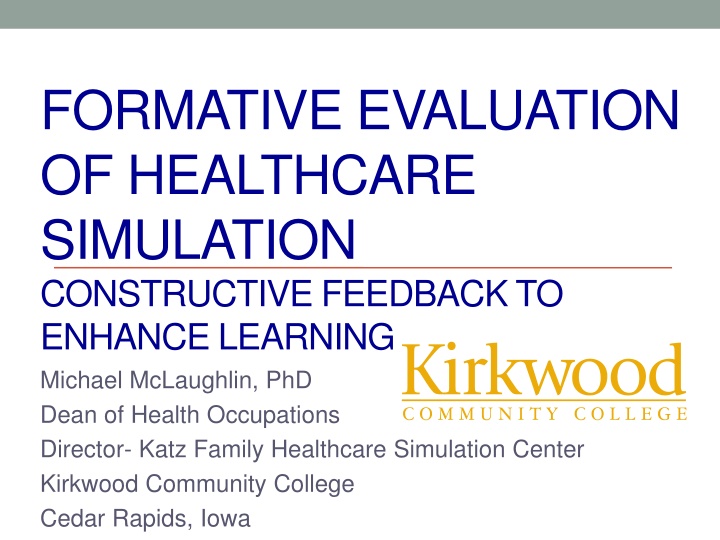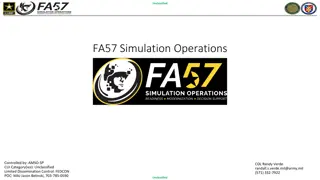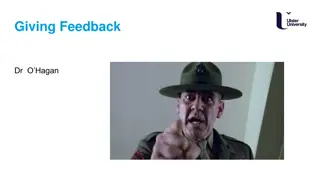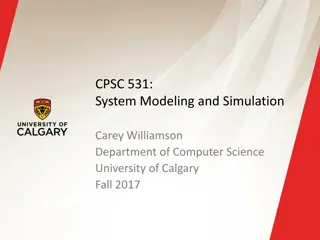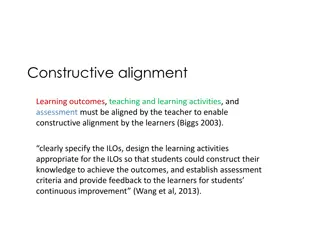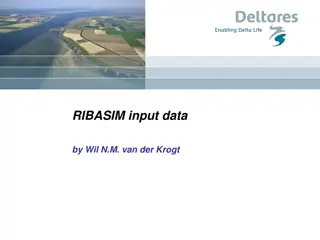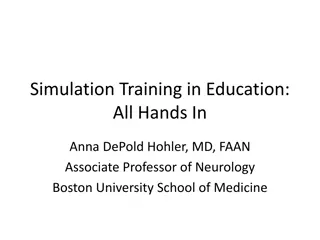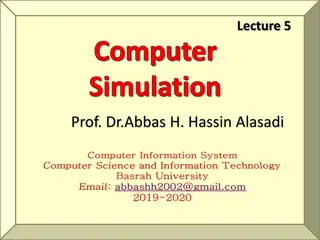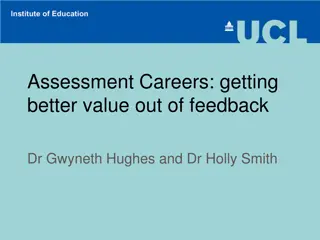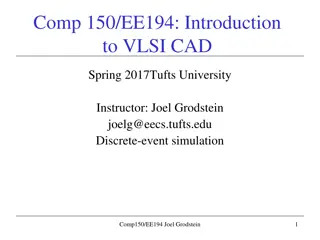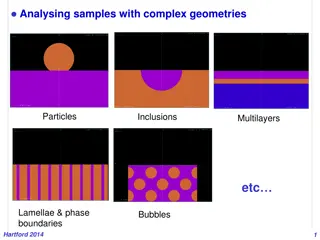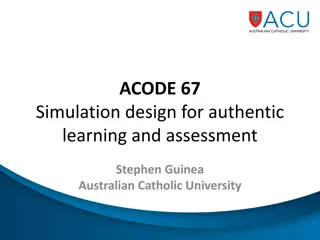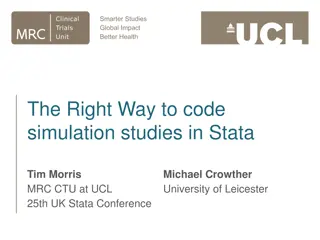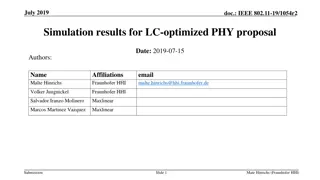Enhancing Healthcare Simulation Through Constructive Feedback
Explore the principles and benefits of healthcare simulation, focusing on formative evaluation and constructive feedback to improve learning outcomes. Delve into the role of formative assessment tools, TeamSTEPPS model, and Mayo High Performance Teamwork Scale in simulation scenarios. Discover the significance of debriefing and Issenberg's teaching principles in creating a comprehensive and effective healthcare simulation program.
Download Presentation

Please find below an Image/Link to download the presentation.
The content on the website is provided AS IS for your information and personal use only. It may not be sold, licensed, or shared on other websites without obtaining consent from the author.If you encounter any issues during the download, it is possible that the publisher has removed the file from their server.
You are allowed to download the files provided on this website for personal or commercial use, subject to the condition that they are used lawfully. All files are the property of their respective owners.
The content on the website is provided AS IS for your information and personal use only. It may not be sold, licensed, or shared on other websites without obtaining consent from the author.
E N D
Presentation Transcript
FORMATIVE EVALUATION OF HEALTHCARE SIMULATION CONSTRUCTIVE FEEDBACK TO ENHANCE LEARNING Michael McLaughlin, PhD Dean of Health Occupations Director- Katz Family Healthcare Simulation Center Kirkwood Community College Cedar Rapids, Iowa
Objectives Review the definitions of formative and summative evaluation Discuss levels/classifications of evaluation Discuss the creation and use of formative assessment tools Review the role of formative assessment in simulation Discuss the TeamSTEPPS model of assessment of team- based performance Review how TeamSTEPPS and the Mayo High Performance Teamwork Scale can be used in simulation
DISCLOSURES The presenter has no disclosures relevant to the topic of the presentation
Benefits of Simulation in Healthcare Education For the learner For the educator Freedom to fail Exposure to high risk, low frequency patients and events Increase confidence Interdisciplinary training Enhance safety and communication- Crew Resource Management (CRM) Increase program capacity Standardized learning and evaluation Increase learner satisfaction Decrease time from beginner to baseline competence
Issenbergs Principles for Teaching with Simulation Provide feedback during the learning experience Require learners to engage in repetitive practice Integrate simulation throughout the curriculum Increase levels of difficulty Adapt simulation to accommodate multiple learning strategies Ensure clinical variation Establish a controlled environment Provide individualized and team learning Define benchmarks and outcomes
Debriefing is. The act of reviewing a real or simulated event in which the participants explain, analyze and synthesize information and emotional states to improve performance in similar situations. Center for Medical Simulation, 2006
The Goals of Debriefing- Mort & Donahue Offer a safe educational environment Offer constructive feedback (formative assessment) Encourage meta-cognition or self-knowledge Promote communication and teamwork Create a culture of change Constructively correct behavior
EXPERIENCE ITSELF IS NOT ENOUGH TO PROMOTE CHANGE The debrief session allows for reflection that enables learning to take place Formative assessment is a critical part of the debriefing process
Formative v. Summative Evaluation Oermann & Gaberson, 2006 Formative Summative Evaluation of learner progress towards goal attainment Learner is provided with immediate feedback Goal is correction and reflection, not terminal evaluation Occurs at the end of the learning experience Feedback provided on success and goal attainment Goal is evaluation not correction or education
Formative assessment is a process used by teachers and students during instruction that provides feedback to adjust ongoing teaching and learning to improve students achievement of intended instructional outcomes Council of Chief State School Officers 2008
Formative assessment practices include not only a variety of informal strategies that teachers may use on the fly , but also formal assessment tasks and methods systematically designed to help teachers probe and promote student thinking and reasoning Messick, 1994
Possible Evaluation Instruments Questionnaires Observation Checklists Attitude Scales Journal or Diary Anecdotal Notes Coaching Cueing Prompting Concept Mapping
Formative Assessment should be: Aligned with developmental objectives to: Meet participant outcomes Provided feedback Remedy errors in thinking and practice Accommodating for varied learning speeds Appropriate for the current level of experience of learners Specific to provide supplemental strategies for achievement of participant outcomes Completed in a manner consistent with best debriefing practices Standards of Best Practices In Simulation: VII- Participant Assessment and Evaluation (2013)
Developing good formative assessment tools Begin with educational values. Reflect the learning as multi-dimensional, integrated, and revealed over time. Have clear, explicitly-state purposes. Align experiences with desired outcomes. Make assessment on-going and not episodic. Involve broad representation from education community. Identify and address the important issues. Include assessment in a larger goal of promoting change. Ensure that goals align with expectations of public. American Association of Higher Education 2011
Five Levels of Assessment (in Simulation) Satisfaction/confidence/self-efficacy Knowledge acquisition Performance Problem-solving abilities Team-based behaviors Bray, B.S. et al 2011
Satisfaction, Confidence and Self-Efficacy Measure learner perceptions Relatively easy to conduct Data help educators understand learner perspectives and attitudes regarding simulation Limitation- data do not provide insight on impact of simulation on student learning Caution- self-efficacy does not always translate into competence as measured by external evaluation
Knowledge and Retention Pre and post simulation assessments Data can be prospective and controlled Assessment is typically written Knowledge attainment assessment can be confounded by other variables (role played, level of fidelity) Poor performance may be due to lack of contextual knowledge of information Successful knowledge acquisition and retention does not translate into competency in application or synthesis of knowledge
Performance-Based Skill Assessment Assessment of performance while in simulation Intubation IV therapy Assessment of psychomotor skill attainment Technical competency does not always translate into clinical competency of critical thinking
Critical-Thinking and Problem-Solving Difficult to measure Tools and instruments common Inter-rater reliability of tool makes this difficult to measure
Behavior and Team Interaction Same challenges as with critical thinking and problem solving evaluation The simulated environment lends itself to evaluating teamwork and team behaviors Goal of assessment is to assess communication and teamwork as it relates to patient safety and outcomes AHRQ and DOD TeamSTEPPS initiative Team Strategies and Tools to Enhance Performance and Patient Safety
TeamSTEPPS Developed by the Department of Defense in collaboration with the Agency for Healthcare Research and Quality (AHRQ) Goal- improve patient safety within healthcare organizations An evidence-based teamwork system to improve communication and teamwork skills among healthcare professionals by integrating teamwork principles Assessment- formative, checklist-based instruments
TeamSTEPPS is an evidence-based framework to optimize team performance across the healthcare delivery system
Team Competency Outcomes Knowledge Shared Mental Model Attitudes Mutual Trust Team Orientation Performance Adaptability Accuracy Productivity Efficiency Safety
Four Key Principles Leadership The ability to coordinate the activities of team members by ensuring team actions are understood, changes in information are shared, and that team members have the necessary resources Situation Monitoring The process of actively scanning and assessing situational elements to gain information, understanding, or maintain awareness to support the function of the team Mutual Support The ability to anticipate and support other team members needs through accurate knowledge about their responsibilities and workload Communication The process by which information is clearly and accurately exchanged among team members
Leadership Team Events Planning- Brief Problem-Solving- Huddle Process Improvement- Debrief Checklists Brief Debrief
Situation Monitoring Cross- Monitoring STEP I M SAFE checklist
Mutual Support Task Assistance Feedback Advocacy and Assertion Two-Challenge Rule DESC Script Collaboration
Communication SBAR Call Out Check Back Handoff- I PASS the BATON
EVALUATION OF TEAMSTEPPS The Mayo High Performance Teamwork Scale
ACTIVITY Simulated Trauma- evaluate teamwork using the Mayo High Performance Teamwork Scale
References Billings, D.M. & Halstead, J.A. (2005). Teaching in Nursing: a guide for faculty (2nded.) Philadelphia: W.B. Saunders Oermann, M.H. & Gaberson, K.B. (2006). Evaluation and Testing in Nurse Education (2nded.). New York. Springer Publishing Jeffries, P.R. (ed). (2007). Simulation in Nursing Education. New York. NLN Publishing Dunn, W.F. (ed). (2004). Simulators in Critical Care and Beyond. Des Plaines, IL. Society of Critical Care Medicine Standards of Best Practice: Simulation (2013) Clinical Simulation in Nursing. 9:65 pp. S3-S29
References Messick, S. (1994) The interplay of evidence and consequence s in validation of performance assessments . Education Researcher. 32, 13-23 Bray, B.S. et al (2011) Assessment of Human Patient Simulation-Based Learning American Journal of Pharmaceutical Education. 75 (10) Article 208 Issenberg, S.F. McGaghie W.C. Petrusa, D.R. et al. Features and uses of high-fidelity medical simulations that lead to effective learning Medical Teacher. 2005; 27(1) 10-28 Nine principles of good practice for assessing student learning. University of South Carolina Institutional Assessment and Compliance http://www.ipr.sc.edu/effectiveness/toolbox/principles.htm Accessed Maay 21 2015 TeamSTEPPS Pocket Guide (AHRQ) Pub # 06-0020-2 2008
